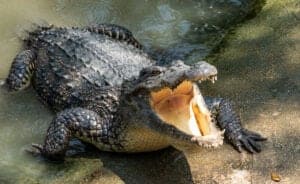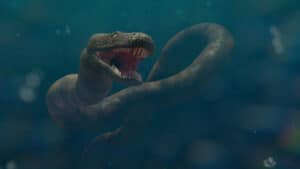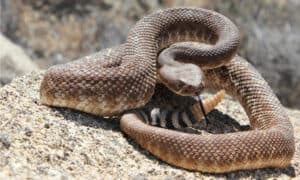What’s the difference between an alligator and a crocodile? Alligators and crocodiles are easy to confuse with one another since they belong to the same phylogenetic order. They’re both large reptiles with lizard-like bodies, tough skin, long tails, stubby legs, elongated snouts, and large teeth.
However, both reptiles have distinct features that can help you figure out which is which. We’ve come up with an overview of the alligator vs. crocodile to show you their physical attributes, feeding habits, the threat they pose to humans, and which one would come out on top in a fight.
Our intention is to take a deep dive into the characteristics of both animals so that you will be able to answer the question: what’s the difference between an alligator and a crocodile? The next time you see one of these reptiles, you’ll know precisely how to tell them apart from a safe distance.
The Difference Between Alligators and Crocodiles
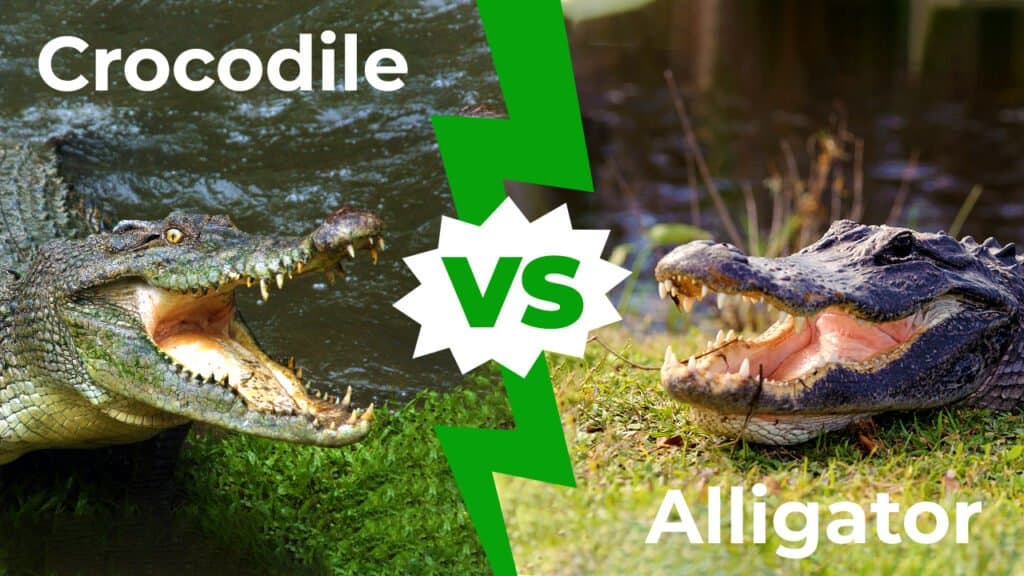
What’s the difference between alligators and crocodiles? Alligators and crocodiles are different species even though they both come from the Crocodile order. Alligators and crocodiles are unique in the size, color, and shape of their snout.
Alligators are black or gray on top with a cream-colored underside, possess a U-shaped snout, and are smaller and timider than crocodiles.
Crocodiles are larger, more aggressive, are mostly green or brown, and have a snout in a V-shape.
Both the alligator and crocodile are not creatures you should approach or antagonize. Although they might flee, they are territorial creatures that harm people every year.
American Alligator vs. American Crocodile
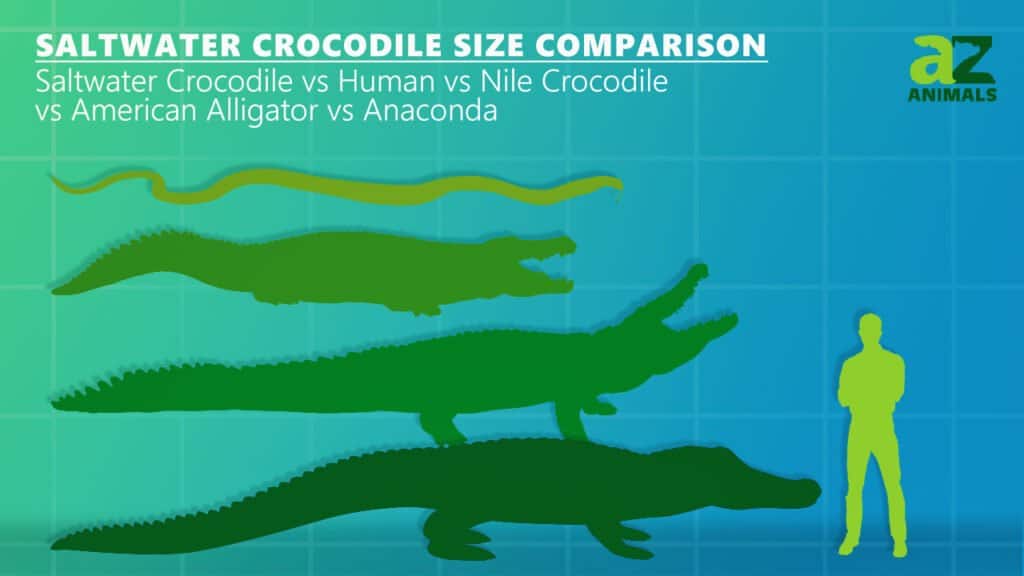
Although they may look similar at first glance, the most significant differences between alligators and crocodiles are their overall size, snouts, jaws, coloring, feet, and teeth. Take a quick look at the ways that you can differentiate between the two reptiles. The comparison between the American alligator and the American crocodile shows the unique qualities of adults from each species.
| Category | Alligator | Crocodile |
|---|---|---|
| Size | 8.2 feet to 11.2 feet long 400lbs to 800lbs | 10 feet to 20 feet long 300lbs to 2,000lbs |
| Snout | U-shaped snout | V-shaped snout |
| Jaws | A wide upper jaw hides the lower teeth and overlaps the lower jaw | The upper and lower jaw are roughly the same size, allowing the teeth to interdigitate |
| Feet | Webbed feet allow for better swimming | Feet are not webbed but possess a jagged fringe |
| Teeth | Roughly 80 teeth | 66 teeth |
| Colors | Dark gray or black, with a cream underside | Olive green or light brown with a mottled pattern |
As with many other creatures, the males are larger in both the alligator and the crocodile, but the crocodile is a much larger reptile overall.
These are the most significant physical differences between the alligator and the crocodile. With just a brief glance, you should be able to identify one of these reptiles, though you might not want to count teeth as your primary means of differentiation.
Where Do Alligators and Crocodiles Live?
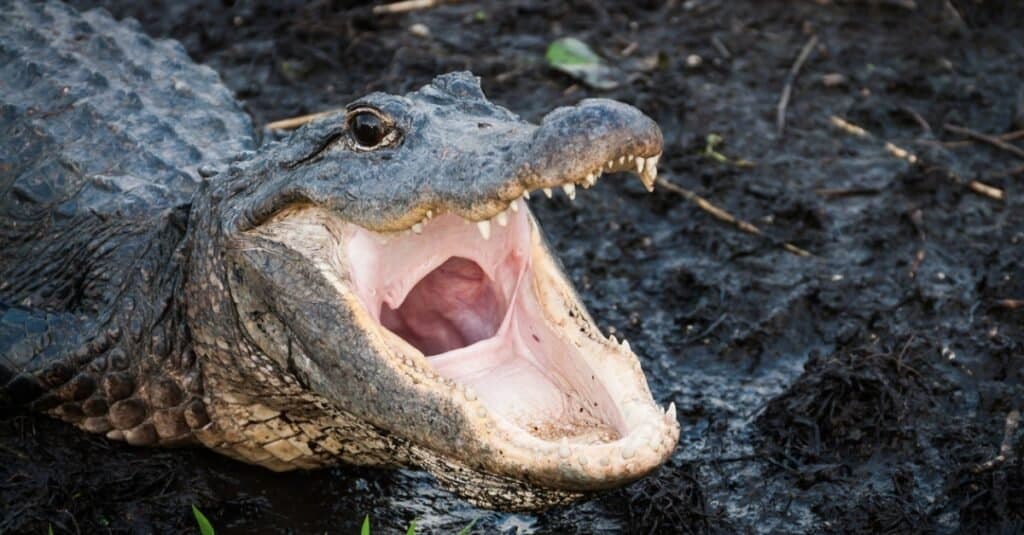
Alligators and crocodiles live near each other in Florida, but their overall distribution is larger
©iStock.com/unclegene
Alligators and crocodiles have unique ranges and habitats that only briefly overlap in a small space of the United States, but each one lives in other places, too. Consider each reptile’s distribution:
| Alligator | Crocodile |
|---|---|
| Southern United States (American alligator) | South Florida (crocodile) |
| China (Chinese alligator) | Central America(American crocodile) |
| Egypt and 25 other countries in Africa (Nile crocodile) | |
| Asia | |
| Oceania | |
| South America |
The alligator has a rather small range in both locations, living along the southern border of the United States from Texas to North Carolina and along the Yangtze River in China.
The crocodile has a much wider distribution throughout the world, and part of the reason for their immense range is their tolerance for saltwater, something not shared by the alligator.
- Alligators prefer to live in freshwater environments such as marshes, rivers, lakes, wetlands, ponds, and even brackish environments.
- Crocodiles are more tolerant of saltwater, and they live in lagoons, islands, rivers, mangrove swamps, lakes, and rivers.
The environment in Florida blends comprises these two habitats and attracts both types of reptiles, allowing them to interact in this small area of the world. Florida is the only place in the United States where American crocodiles can be found.
What Do Alligators and Crocodiles Eat?
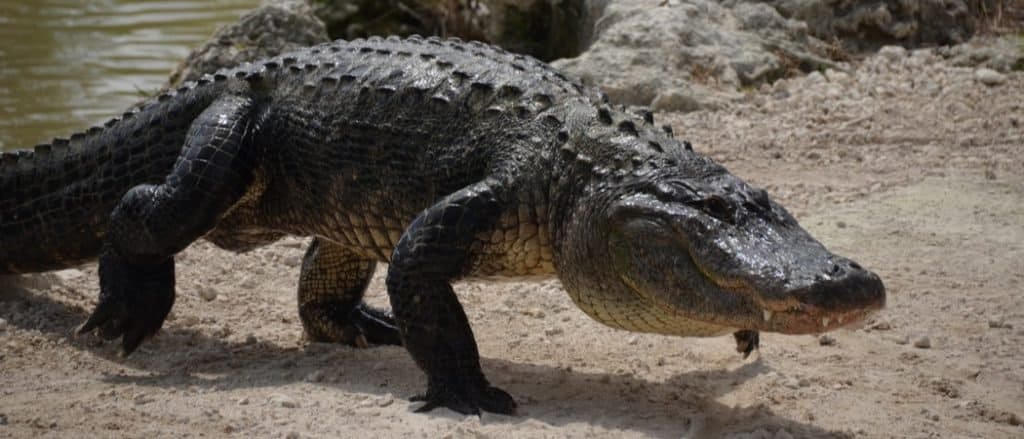
Alligators and crocodiles eat fish, turtles, large and small mammals, and snakes.
©Rod Zadeh/Shutterstock.com
What’s the difference between an alligator and a crocodile in terms of their diet? Both the alligator and crocodile eat fish, birds, turtles, and various mammals. They are apex predators that primarily consume other animals as their sole source of nutrition.
The American alligator and American crocodile share a small overlap in their distribution, but they each have access to much different potential prey.
Take a look at the most common prey for these two highly capable hunters.
| Alligator | Crocodile |
|---|---|
| Fish | Carrion |
| Frogs | Flamingos |
| Turtles | Bass |
| Birds | Wildebeest |
| Sharks | Tilapia |
| Rays | Goats |
| Snakes | Domestic dogs |
| Tadpoles | Frogs |
| Spiders | Possums |
| Worms | Storks |
| Bobcats | Sea Turtles |
| Wild Boars | Insects |
| Deer | Cattle |
| Florida panthers | Sharks |
| Black bears | Crabs |
As you can see, the diet of both alligators and crocodiles is diverse. The crocodile has more potential prey than the alligator owing to the fact that it has a larger range and frequently lives in and around saltwater.
Interestingly, both alligators and crocodiles have been recorded eating various fruits, but they are not a substantial portion of their diets. The inconsistency of these reptiles seeking anything other than meat has led to them still being classified as carnivores rather than omnivores.
Both reptiles are very dangerous to their prey, capable of attacking creatures larger than themselves with a high rate of success.
Alligator vs. Crocodile: How Do They Hunt?
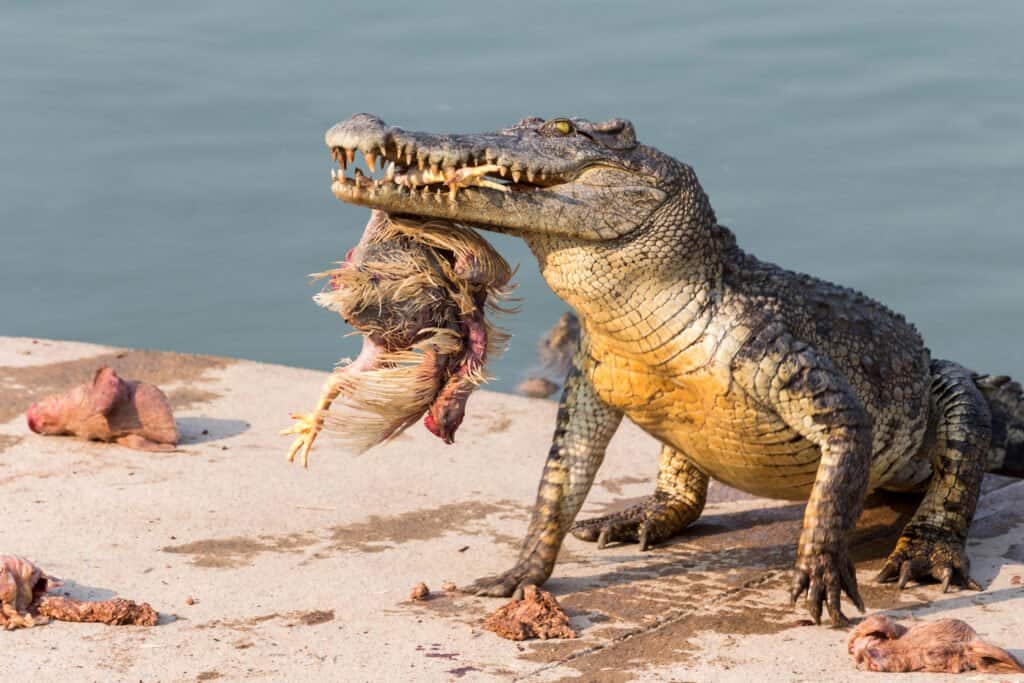
Alligators and crocodiles are ambush hunters with keen senses of sight and touch.
©iStock.com/Gumpanat
What is the difference between alligator and crocodile hunting methods? Alligators and crocodiles are large creatures that are considered apex predators; they are the toughest animals around. Another interesting similarity between the two is that they both thrive in aquatic conditions, often living along coastlines and spending a lot of time in the water.
The alligator does not have great sight in the water because of their nictitating membrane that protects their eyes underwater, but they are highly receptive to vibrations, making them keen hunters. Their sight is good on land, especially at night. They can also detect vibrations with great certainty.
Crocodiles’ senses are very keen, with great nocturnal vision and the same third eyelid as alligators. Their domed pressure receptors, organs that help them detect changes in pressure, allow crocodiles to find prey and sense the world around them even at night. Needless to say, crocodiles have the tools to seek and kill their prey.
Consider how each reptile hunts and kills its prey; the similarities are interesting but not altogether surprising.
Alligators Hunting Methods
Alligators are opportunistic ambush hunters. That means they lie in wait for their prey to come by and then attack it when conditions are in their favor. Oftentimes, alligators will wait with just their eyes and nostrils above water, concealing the rest of their bodies beneath the water.
When their prey comes close enough to the edge of the water, to drink water perhaps, the alligator will rapidly swim towards its prey, grab it with its teeth and powerful jaws, and slay it. Other times, they will wait in the tall grasses in which they rest and ambush prey.
Alligators have several interesting methods by which they kill other creatures. The simplest way to kill enemies is simply to clamp down with their teeth, kill the prey, and swallow it. Their bite is strong enough to pierce a turtle’s shell.
If they are hunting in water, the alligator will often snatch its prey from the water bank and drown it before consuming it.
Another way that alligators kill other animals is by using a “death roll.” Basically, they grab a part of their prey and roll their bodies over and over until they accomplish dismemberment or death. This technique allows them to subdue and dismember larger animals, like boars or bears.
They will also grab their prey and thrash about, shaking it until the animal’s bones break and flesh tears.
Alligators are very effective hunters that face few threats from other animals in their habitat.
Crocodiles Preying Habits
Crocodiles are not quite as fast as alligators on land or in the water, but their size is indomitable. They are ambush predators by nature, using their amazing senses to find enemies and then using their powerful jaws and teeth to make them into a meal.
Like alligators, crocodiles typically wait in the water for prey to come drink or cool off, and then they strike. They will approach their prey and ambush them, often dragging them into the depths to drown them, eating them whole, thrashing them, or using a death roll to seriously harm their prey until it dies.
The crocodiles’ size works in their favor, allowing them to kill large prey like wildebeests and even sharks. Their stomachs are highly acidic, facilitating the digestion of bones, hooves, and other byproducts of hunting.
Crocodiles are also scavengers and they’re not afraid to steal a kill. Few animals want to challenge a crocodile for their food.
Overall, these two creatures have similar hunting behaviors and several evolutionary traits that make them tremendous killers.
Alligator vs. Crocodile: Who Would Win in a Fight?
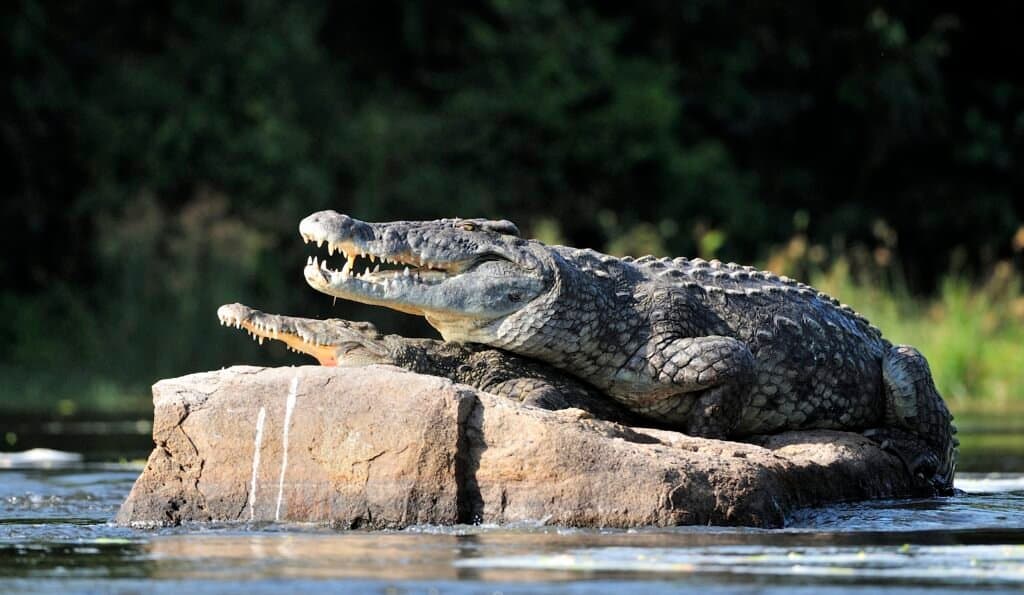
Crocodiles win the fight because they’re bigger, stronger, and more aggressive than alligators.
©iStock.com/USO
What’s the difference between an alligator and a crocodile in terms of overall strength? Which one would win in a fight? Although the chances of them meeting are not great due to population differences and ranges, a match between these two heavyweights could happen in southern Florida.
That begs the question, in a fight between an alligator and vs. crocodile, who would win? By comparing relevant data, we can see what happens when you make two apex predators fight.
Let’s take a look at the tale of the tape as we set up the battle of apex predators: alligator vs. crocodile!
| Category | Alligator | Crocodile |
|---|---|---|
| Size | 8.2 feet to 11.2 feet long 400lbs to 800lbs (sometimes more) | 10 feet to 20 feet long 300lbs to 2,000lbs |
| Bite Strength | 13,172 N | 16,414 N |
| Top Land Speed | 30 mph | 22 mph |
| Top Water Speed | 20 mph | 15 mph |
| Aggression | Alligators attack when they feel threatened but often flee when faced with uncertainty | Crocodiles are highly territorial creatures that will attack without much provocation |
If you were to pit an alligator vs. crocodile with the biggest of each species, the smart bet would be the crocodile wins in a fight. Sure, alligators are faster on land and water, but the size, bite power, and sheer aggressiveness of the crocodile give them an edge that an alligator could not overcome.
Even if the two creatures were the same size, the crocodile’s keen senses and longer lifespan would almost certainly give it the power it needs to overcome an alligator. However, fair matches are not something that happens often in the wild.
*The land and water speeds represent short bursts and not consistent speeds.
Alligator vs. Crocodile— Which Is More Dangerous to Humans?
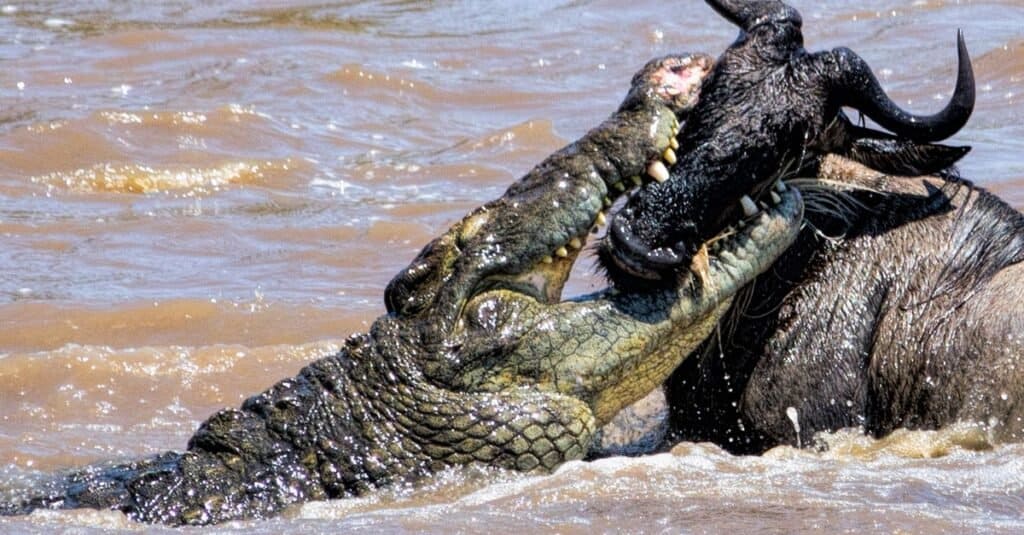
Crocodiles are far deadlier than humans, killing over a thousand people each year.
©Phil Hyde/Shutterstock.com
Both alligators and crocodiles have had fatal encounters with human beings in the past, but several factors point to crocodiles being far more dangerous to humans. The following elements determine how much danger these creatures pose to people:
- Aggression
- Proximity to Humans
- Population
- Size
- Strength
Crocodiles tend to be far more aggressive than alligators, with the latter preferring to flee when confronted by human beings. On one hand, many of the recorded attacks of alligators on humans have occurred in water where humans inadvertently mimic prey or when the alligator is actively searching for food. They kill about one person per year in the United States.
On the other hand, crocodiles kill roughly 1,000 people per year in Africa alone. They are far more aggressive, and their vast size compared to alligators leads to more fatal encounters than non-fatal attacks. Fortunately, they have a small population in the U.S.
Interestingly, large populations of crocodiles live close to humans, and the same holds true for alligators. For example, the alligator population is high in Florida, but attacks on humans are rare, especially fatal attacks.
The overwhelming size and aggression of crocodiles make them more dangerous to humans. When caught in their grasp, it’s nearly impossible to fight back against a crocodile. So, if you encounter an alligator vs. crocodile, you stand a better chance than the other way around.
The Lifespan of an Alligator vs. Crocodile
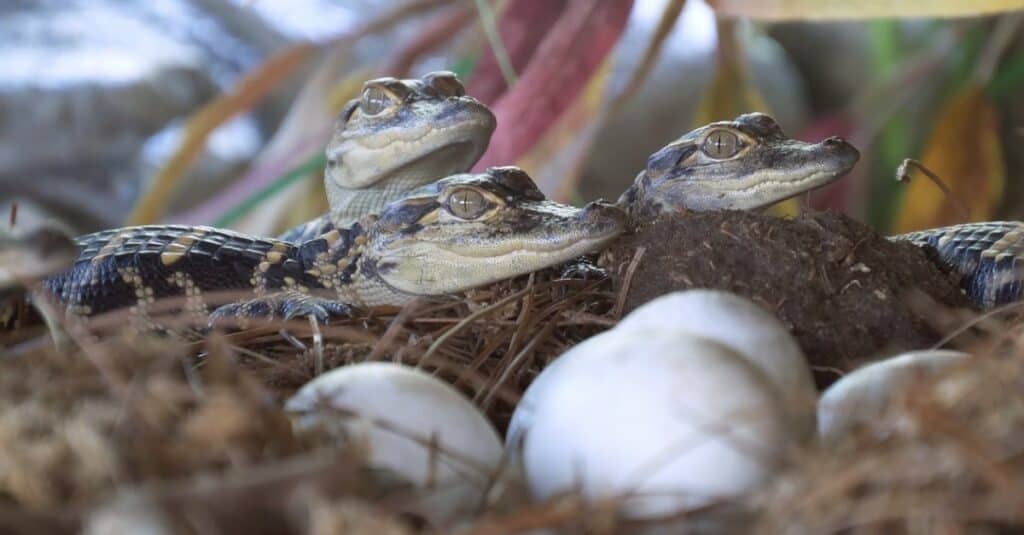
Crocodiles live longer, but both creatures have long lifespans.
©DimaSid/Shutterstock.com
Alligators and crocodiles that make it to adulthood tend to stick around for a long time. After all, they’re at the top of the food chain and they are hard to kill in the wild.
On average, alligators can survive between 30 and 60 years. That is a lot of time to spend hunting prey in murky waters!
Crocodiles can survive anywhere between 20 and 70 years, so they’re slightly more long-lived than their cousins. Once again, in the battle of alligator vs. crocodile, the gator comes up short.
Crocodiles can live to old age and grow into monstrous sizes, allowing them to become staple predators in a given area for a long time.
Alligator vs. Crocodile: Fun Facts
Here are some fun facts about alligators and crocodiles:
- Alligators are native to the US and can be found in the southeast, while crocodiles are more widespread and can be found worldwide.
- Alligators have a more rounded snout, while crocodiles have a V-shaped snout.
- Alligators are generally smaller than crocodiles, with the average length being around 10-12 feet for alligators and 15-17 feet for crocodiles.
- Alligators are better adapted to living in freshwater environments, while crocodiles can tolerate saltwater and can be found in both freshwater and saltwater environments.
- Alligators are more passive and solitary creatures, while crocodiles are more aggressive and social.
- Alligators are known for their powerful bite, which can exert up to 2,000 pounds of force, while crocodiles have the strongest bite of any living animal, with a force of up to 3,000 pounds.
- Alligators are omnivores, while crocodiles are primarily carnivores.
- Alligators have a bony plate in their upper jaw that helps to protect their eyes and nose, while crocodiles have a bony ridge on the top of their snout that helps to protect their eyes.
- Alligators can hold their breath for up to an hour, while crocodiles can hold their breath for up to 2 hours.
- Alligators are listed as threatened species, while crocodiles are considered vulnerable to extinction. Conservation efforts are underway to protect both species and their habitats.
Predators of Alligators and Crocodiles
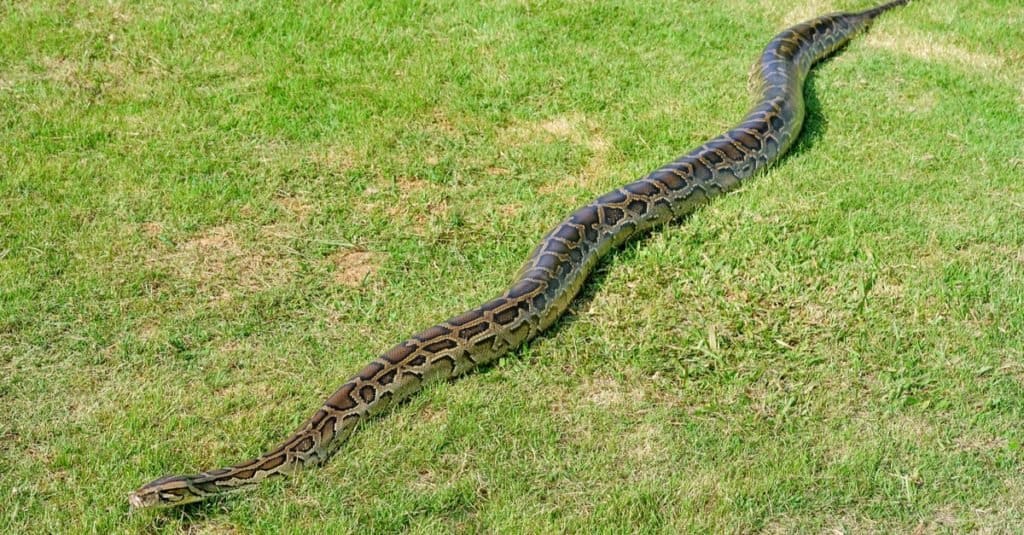
Pythons will often eat alligator and crocodile eggs.
©Yatra/Shutterstock.com
Even though they are apex predators, both alligators, and crocodiles face external threats. Take a look at some of the more common predators faced by each.
Alligators are very vulnerable when they are young, and the following creatures can kill them:
- Snakes
- Bobcats
- Otters
- Alligators
- Sharks
- Bears
- Eagles
- Herons
- Humans
Of course, most of these creatures are grown alligator prey, too.
Crocodiles are also preyed upon when they’re still growing, and their enemies include:
Remember that most of these predators attack the eggs or babies of these reptiles; most do not stand a chance of killing the adults.
In both cases, humans are the most significant predator of adults. They are killed for meat, out of fear for their safety, or through the process of habitat destruction. Human beings pose the greatest threat to both alligators and crocodiles.
With all this information in hand, you should be able to tell the difference between an alligator and a crocodile. One sees you later and the other sees you after a while. On a serious note, if you encounter either creature in the wild, identifying them should be the last thing on your mind compared with maintaining a safe distance.
Most of the time, neither creature will bother you if you stay away from them. Remember that you are most in danger when lingering on the edge of the water or traveling through infested areas at night.
Lastly, we have to settle the debate: who wins between an alligator and a crocodile? Based on the evidence available, it’s the crocodile the majority of the time.
Watch Our YouTube Video on the Differences Between These Two Animals!
Could a Lion Beat a Crocodile in a Fight in the Wild?
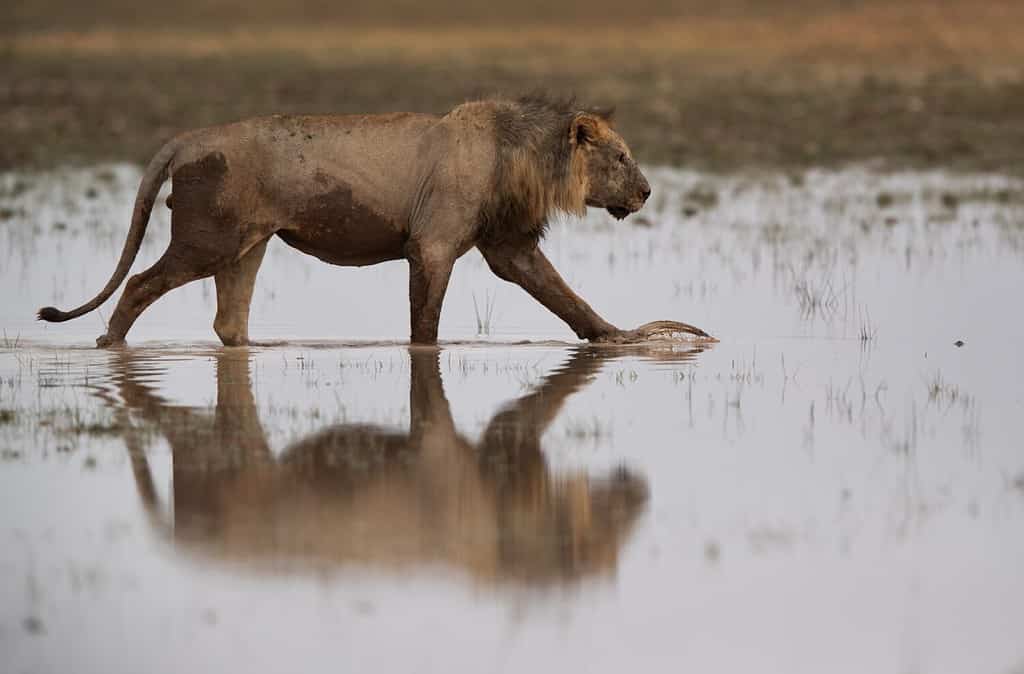
©Dr Ajay Kumar Singh/Shutterstock.com
In a head-to-head fight, a crocodile would defeat an attacking lion.
It is fun to imagine different apex predators locking in battle to fight over territory or for the rights of which is stronger. Let us examine how a lion would fair in a fight with a crocodile!
We all know how powerful and fast a lion is, but it would fall in a straight-up contest with a crocodile. The weight, strength, and size of the giant reptile would be too much for the feline to bring down.
In a real-world scenario, if a stealthy croc was able to ambush a lion while it drank some water from a body of water, the fight might be over before it started. The powerful jaws of the crocodile would latch onto the big cat and start to draw it to the water, which would spell death.
A more evenly matched battle would take place if the two predators met on neutral territory. With enough room to maneuver, the lion could land some blows on the croc and seriously wound it. However, all it would take for the crocodile is landing one well-timed bite to bring down the lion.
The photo featured at the top of this post is © Sergey Uryadnikov/Shutterstock.com
Thank you for reading! Have some feedback for us? Contact the AZ Animals editorial team.



